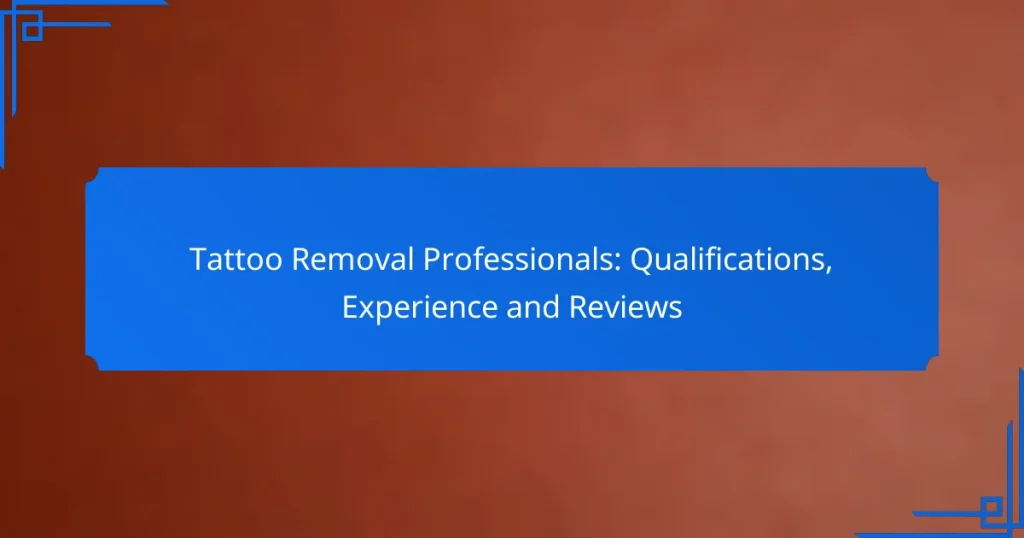Choosing the right tattoo removal professional is crucial for achieving safe and effective results. Look for individuals with the appropriate certifications, medical training, and specialized education to ensure compliance with regulations and build trust. Additionally, evaluating their experience through client testimonials and before-and-after photos can provide valuable insights into their expertise and service quality.
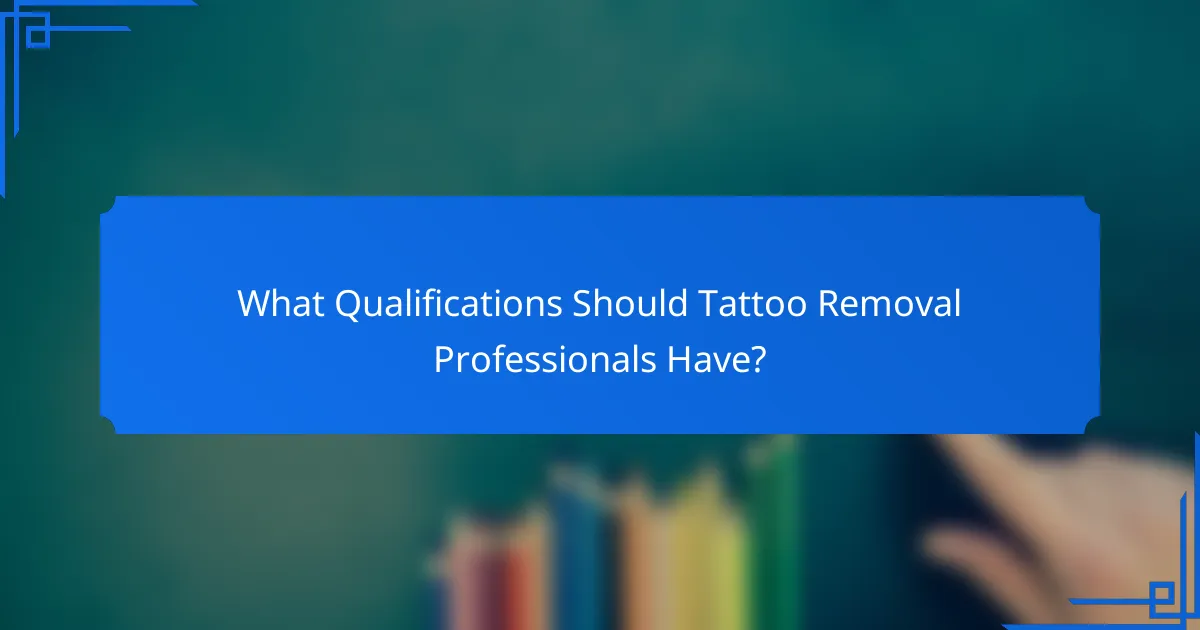
What Qualifications Should Tattoo Removal Professionals Have?
Tattoo removal professionals should possess a combination of certifications, medical training, and specialized education to ensure safe and effective procedures. These qualifications help clients trust their expertise and ensure compliance with local regulations.
Certification in Laser Technology
Professionals should be certified in laser technology, as this is the primary method used for tattoo removal. Certification programs typically cover the physics of lasers, safety protocols, and hands-on training. Look for providers who have completed recognized courses from reputable institutions.
Certification ensures that the technician understands how to operate the equipment safely and effectively, reducing the risk of complications. Always ask to see proof of certification before proceeding with treatment.
Medical Background
A medical background is beneficial for tattoo removal professionals, particularly for those who have experience in dermatology or cosmetic surgery. This knowledge helps them assess skin types and conditions, which is crucial for tailoring the removal process to individual needs.
Professionals with a medical background can better manage potential side effects and complications, providing a higher level of care. If possible, choose someone with a nursing or medical degree for added assurance.
Specialized Training in Tattoo Removal
Specialized training in tattoo removal techniques is essential for effective treatment. This training often includes understanding different ink types, skin reactions, and the latest removal technologies. Look for professionals who have completed specific courses focused on tattoo removal.
Such training equips technicians with the skills to customize treatment plans and achieve optimal results. Inquire about their training history and any additional certifications related to tattoo removal.
State Licensure Requirements
Each state has its own licensure requirements for tattoo removal professionals, which can include specific training hours and examinations. It is crucial to verify that the professional you choose complies with local regulations to ensure safety and legality.
Check your state’s health department website for detailed information on licensure requirements. Working with a licensed professional can help you avoid potential legal issues and ensure adherence to safety standards.
Continuing Education
Continuing education is vital in the ever-evolving field of tattoo removal. Professionals should engage in ongoing training to stay updated on the latest technologies, techniques, and safety protocols. This commitment to learning can significantly enhance their skills and the quality of care they provide.
Look for professionals who participate in workshops, conferences, or online courses related to tattoo removal. Regularly updated knowledge can lead to better outcomes and a more satisfying experience for clients.
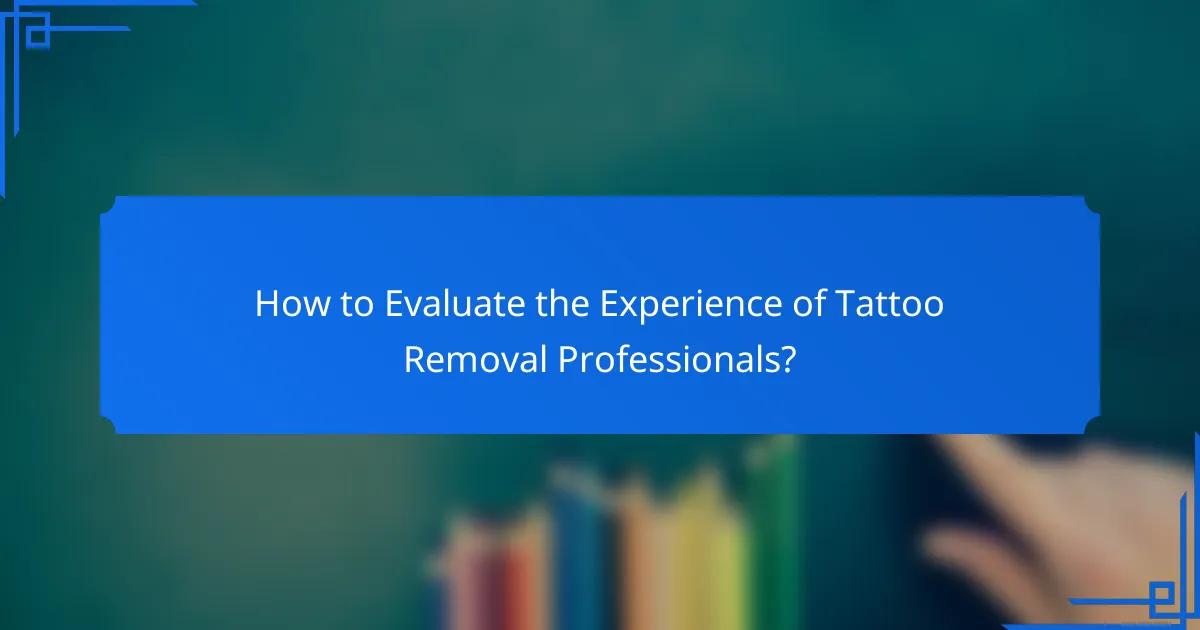
How to Evaluate the Experience of Tattoo Removal Professionals?
To evaluate the experience of tattoo removal professionals, consider their years of practice, types of procedures performed, client testimonials, and before-and-after photos. These factors provide insight into their expertise and the quality of their services.
Years of Practice
Years of practice can be a strong indicator of a tattoo removal professional’s expertise. Generally, look for someone with at least 3-5 years of experience in the field, as this duration often allows for the development of refined skills and techniques.
Additionally, inquire about their training and certifications. Professionals who have undergone specialized training in laser technology or skin care may offer a higher level of service.
Types of Procedures Performed
Understanding the types of procedures performed is crucial in evaluating a professional’s capabilities. Common methods include laser removal, surgical excision, and dermabrasion. A skilled practitioner should be well-versed in multiple techniques to tailor the approach based on individual skin types and tattoo characteristics.
Ask about the specific equipment and technologies used, as advancements in laser technology can significantly affect the effectiveness and safety of the removal process.
Client Testimonials
Client testimonials provide valuable insights into a professional’s reliability and quality of service. Look for reviews on reputable platforms or the professional’s website to gauge overall satisfaction.
Pay attention to comments regarding pain levels, recovery time, and the final results. A high number of positive reviews can indicate a trustworthy practitioner, while consistent negative feedback may be a red flag.
Before-and-After Photos
Before-and-after photos are essential for assessing the effectiveness of a tattoo removal professional’s work. These images should clearly show the results of previous clients and demonstrate the professional’s ability to achieve desired outcomes.
Ensure that the photos are authentic and not overly edited. A reputable professional will have a portfolio showcasing a variety of cases, allowing you to see their range of expertise and the types of tattoos they have successfully removed.

What Are the Key Reviews to Consider?
When evaluating tattoo removal professionals, key reviews focus on the quality of service, customer satisfaction, and overall effectiveness of the procedures. These reviews can provide insights into the experiences of past clients and help you make informed decisions.
Online Review Platforms
Online review platforms like Google Reviews, Yelp, and Trustpilot are essential for assessing tattoo removal professionals. These sites aggregate customer feedback, allowing you to see ratings and read detailed experiences from clients. Look for professionals with a high number of positive reviews and consistent feedback regarding their techniques and results.
Pay attention to the overall ratings, but also read individual reviews for specific insights about the staff’s professionalism, the cleanliness of the facility, and the effectiveness of the treatments. A professional with a solid reputation on these platforms is likely to provide a better experience.
Social Media Feedback
Social media platforms such as Facebook and Instagram can offer a more personal glimpse into the experiences of clients. Many tattoo removal professionals showcase their work and client testimonials on these platforms, which can help you gauge their expertise and results. Look for before-and-after photos that illustrate the effectiveness of their treatments.
Engaging with comments and posts can also provide real-time feedback from clients, allowing you to ask questions and gather more information about their experiences. Be cautious of overly positive or negative comments, as they may not reflect the overall quality of service.
Word-of-Mouth Recommendations
Word-of-mouth recommendations from friends, family, or colleagues can be invaluable when choosing a tattoo removal professional. Personal experiences often carry more weight than online reviews, as they come from trusted sources. Ask about the effectiveness of the treatments and the professionalism of the staff.
When seeking recommendations, consider the specific needs of your tattoo removal journey, such as skin type and tattoo size. A referral from someone who had a similar experience can lead you to a professional who is well-suited for your needs.
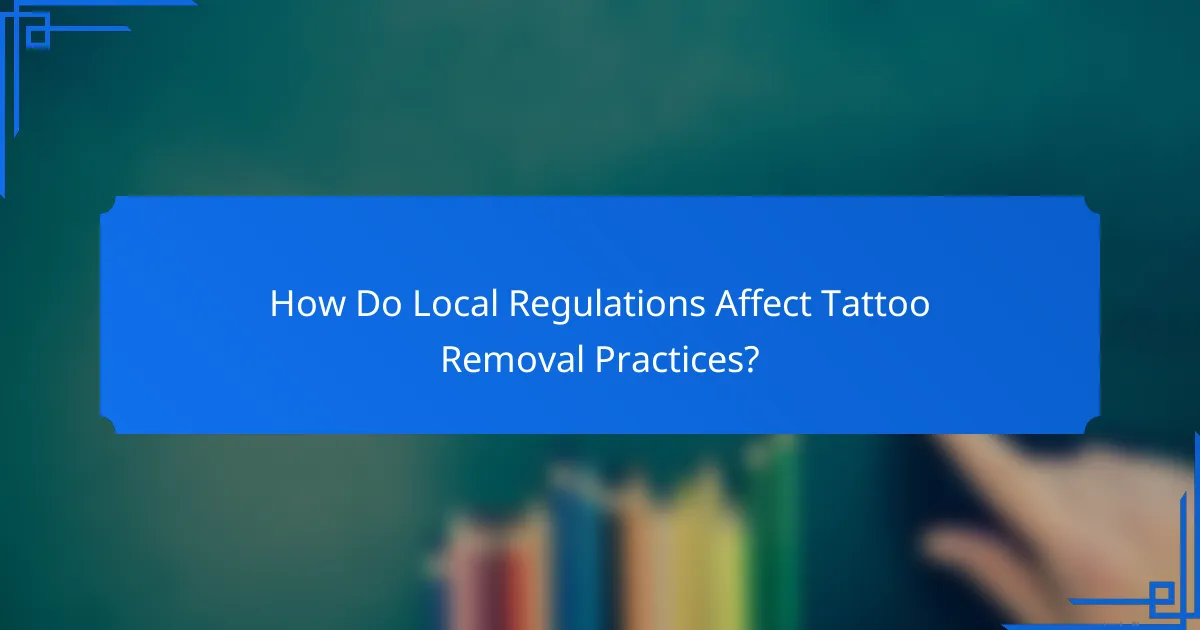
How Do Local Regulations Affect Tattoo Removal Practices?
Local regulations significantly influence tattoo removal practices by establishing health and safety standards, licensing requirements, and compliance protocols. These regulations ensure that tattoo removal is performed safely and effectively, protecting both clients and practitioners.
Health and Safety Standards
Health and safety standards for tattoo removal vary by location but generally include guidelines on sanitation, equipment sterilization, and infection control. Practitioners must use FDA-approved devices and follow strict hygiene protocols to minimize risks of infection or complications.
For example, facilities may be required to maintain a clean environment, use disposable materials, and ensure that all staff are trained in safe practices. Regular inspections by health authorities may also occur to ensure compliance with these standards.
Licensing and Compliance
Licensing requirements for tattoo removal professionals differ across regions, often necessitating specific training and certification. Many states or countries require practitioners to hold a license that demonstrates their competency in using laser technology and understanding skin anatomy.
Compliance with local laws is crucial; failure to adhere to licensing regulations can result in fines or the closure of the practice. Prospective clients should verify that their chosen provider is properly licensed and in good standing with local health departments.
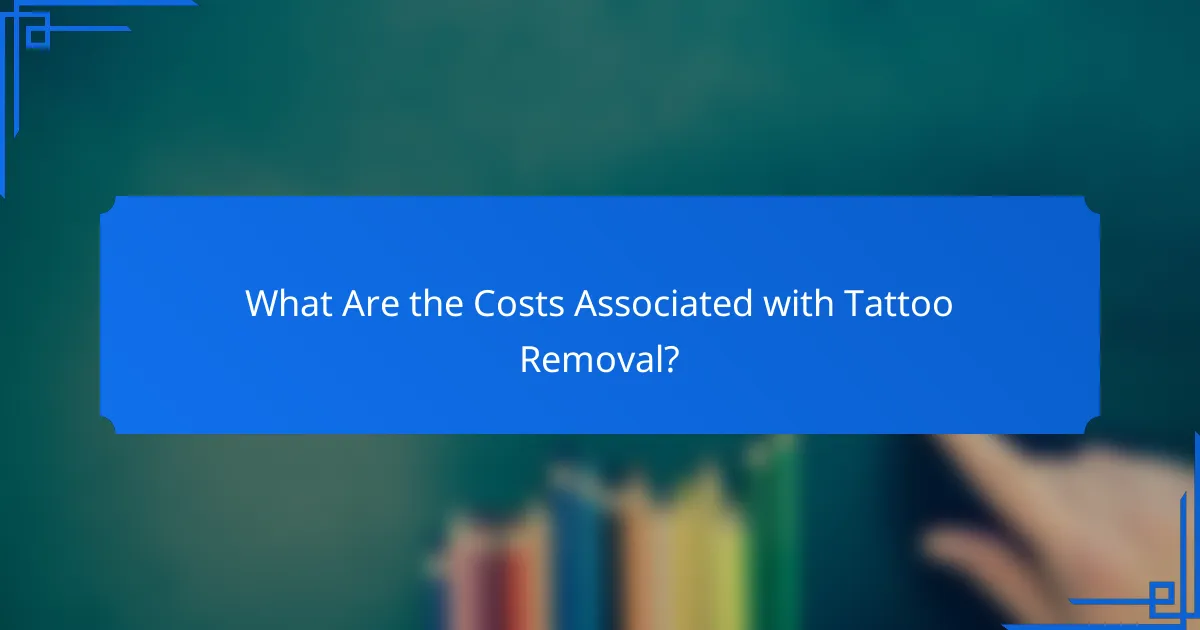
What Are the Costs Associated with Tattoo Removal?
The costs associated with tattoo removal can vary significantly based on several factors, including the method used and the size of the tattoo. Generally, individuals can expect to pay anywhere from a few hundred to several thousand dollars for complete removal.
Average Price Range
The average price range for tattoo removal typically falls between $200 and $500 per session, depending on the treatment method. Most tattoos require multiple sessions for complete removal, which can lead to total costs ranging from $1,000 to $5,000 or more.
For example, laser tattoo removal is one of the most common methods and usually costs around $300 to $500 per session. In contrast, other methods like surgical excision may have higher upfront costs but could be more effective for certain tattoos.
Factors Influencing Cost
Additionally, the type of removal method chosen can affect pricing. Laser removal is popular but may vary in cost based on the technology used, while other methods like dermabrasion or chemical peels may have different price structures. Location can also impact costs, as urban areas often have higher prices due to increased demand.
Lastly, the experience and qualifications of the tattoo removal professional can influence fees. Highly trained specialists may charge more, but their expertise can lead to safer and more effective results.
